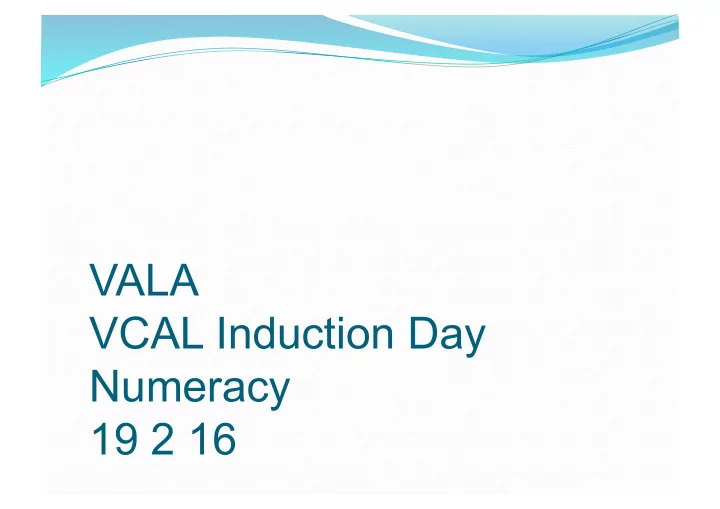

VALA VCAL Induction Day Numeracy 19 2 16
Welcome to VCAL Numeracy
Introductions
Game of 11 You may choose to count by 1, 2 or 3 increments but if you say 11 – you are out!! Variations can be as a game of 21 or reverse countdown.
Some of the good things about teaching VCAL Numeracy teacher creativity student negotiation time to do tasks chance to explore links to real life great PD opportunities always engaging…. never boring
Where do I start?
Step1 Get to know your VCAL group! VET Hobbies Level
VCAL Numeracy Levels Foundation Intermediate Senior Advanced Senior
VCAL Levels Activity You are given 9 pieces of paper that are mixed up. Your task is to put them into 3 groups – Foundation, Intermediate and Senior
Step 2 Visit the VCAA Website VCAL Unit Sample Assessment Task Templates http://www.vcaa.vic.edu.au/Pages/vcal/ providers/quality/section2.aspx VCAL Curriculum Planning Guides http://www.vcaa.vic.edu.au/Documents/vcal/ curricplanguidelns-Numeracyskills.pdf VCAL First http://www.vala.asn.au/vcal-first/VCAL-first- lores.pdf
Resources Textbooks https://ala.asn.au/wp-content/uploads/2011/04/ DaveTout-NumeracyResourcesDT11.pdf ICT BBC Maths, IXL Maths, Superteacherworksheets PD
QA (Quality Assurance) 2016 Regions submitting Numeracy QA Templates in 2016 are Grampians and Northern Metropolitan. Your SATT is due Friday 25 th March, 2016. Your VCAL Liaison Teacher will advise you of Stage 1 and Stage 2 dates in your region. Numeracy must address 4 Learning Outcomes. QA must be presented at your highest level (2016). http://www.vcaa.vic.edu.au/Documents/vcal/qakit/ vcal_qakit.pdf
QA SAT Template 2016 http://www.vcaa.vic.edu.au/Pages/vcal/providers/ quality/section2.aspx#H3N10113
VCAL is CBA VCAL is a competency based program. Students are assessed against their capacity to demonstrate a particular skill.
Grid Activity How an activity can be recorded and assessed.
Unpacking a VCAL unit of competency
Unpacking a VCAL unit of competency What is the project/theme? What tasks are involved within the project? What outcomes are covered by the project/theme? What VCAL level will the unit be written to? What level of support will the teacher provide? What resources are needed to support the project? What tasks will the student need to carry out? What evidence is needed to demonstrate competency of the outcomes? How will this evidence be collected and presented? Does this project integrate against other VCAL units? What resources are needed to support the project?
Structuring a VCAL Unit
The unit is to be; -scaffolded -QA compatible -inclusive -practical -real world -integrated -and enjoyable.
scaffolded We were inserviced in the “Scaffolding Numeracy in the Middle Years” and completed an assessment task on Multiplicative Thinking. www.education.vic.gov.au/studentlearning/teachingresources/maths
scaffolded The scaffolding task we believe brought two things to the fore; Firstly, even in an Intermediate group, there are many different levels of student capacity And secondly, the presentation of the unit to the students needed to be graduated.
QA compatible The unit that was developed needed to be compatible with current Quality Assurance guidelines.
inclusive The unit needed to engage all students in the classroom and provide them all with an avenue of success. That is, some students may need extra assistance to consolidate their learning and others may need extension activities.
Practical/Real world That the unit would take the students out of the classroom into a number of different settings. That the tasks were easily adaptable to circumstances that the students will encounter later on in life.
integrated That the unit would not only cover the learning outcome of Location but also would incorporate other Numeracy outcomes. That the unit would provide opportunities to integrate across the other VCAL strands.
enjoyable That the students have a say in some of the activities. That the tasks allow the students to experience out of classroom experiences. That the students are provided with a level of autonomy in completing some of the tasks.
Location Game 2 Teams of four. You have 5 minutes for this activity. Team roles are Time-Keeper, Note Taker, Opinions Taker and Team Leader.
scaffolded
Activities A map grid – (Classroom activity) Mapping activity –School campus Excursion – ‘Watergardens Mapping task’ Excursion – ‘Amazing Race’
Activities A map grid – (Classroom activity) -As a pre excursion activity students located grid references. -Students were familiarised with key words. -All students were encouraged to talk to each other to become familiar with the mathematical language.
Key Words Understand the meanings for the following key words. - scale - vertical scale - horizontal scale - grid references -co-ordinates - ratio - bearing
Activities Mapping activity – Incursion – School campus -Students completed a map reading task. -Students created a map grid, with symbols. -Used keys and symbols to locate places of interest. -Students had turns of giving and following instructions.
Activities Excursion – ‘Watergardens Mapping task’ -Students had to estimate distances between locations between scale indicators. -Students had to use the Watergardens Information brochure to locate, identify and familiarise themselves with the centre’s facilities.
Activities Excursion – ‘Amazing Race’ -Students had to locate key sites of the city. -Students had to plan appropriate pathways and make effective use of time. -Students used phones and cameras to communicate and provide evidence. -Students had to strategically maximize the number of points earned.
QA compatible Maps directly to Learning Outcomes of Location, Measuring and Money and Time. Maps some elements of Learning Outcomes for Design and Numerical Information. Tasks can incorporate other VCAL Strands.
Possible Extensions Country trips Overnight city stay Planning itinerary for family holiday Budgeting holidays Multi mapping exercises Designing tourist brochures Incorporating ICT
integrated organizing excursions -PDS teamwork skills –PDS OH&S- WRS tourist brochure-LIT video of Melbourne-LIT newspaper article-LIT
Resources • Worksheets, feedback sheets, permission notes. • Word find sheet (key mathematical words) • ICT (Google earth) • Compass, rulers, measuring tapes, clickometers. • Maps, brochures, timetables. • Rubric • Calculator • Money • Cameras, mobile phones. • Stopwatch
Recommend
More recommend